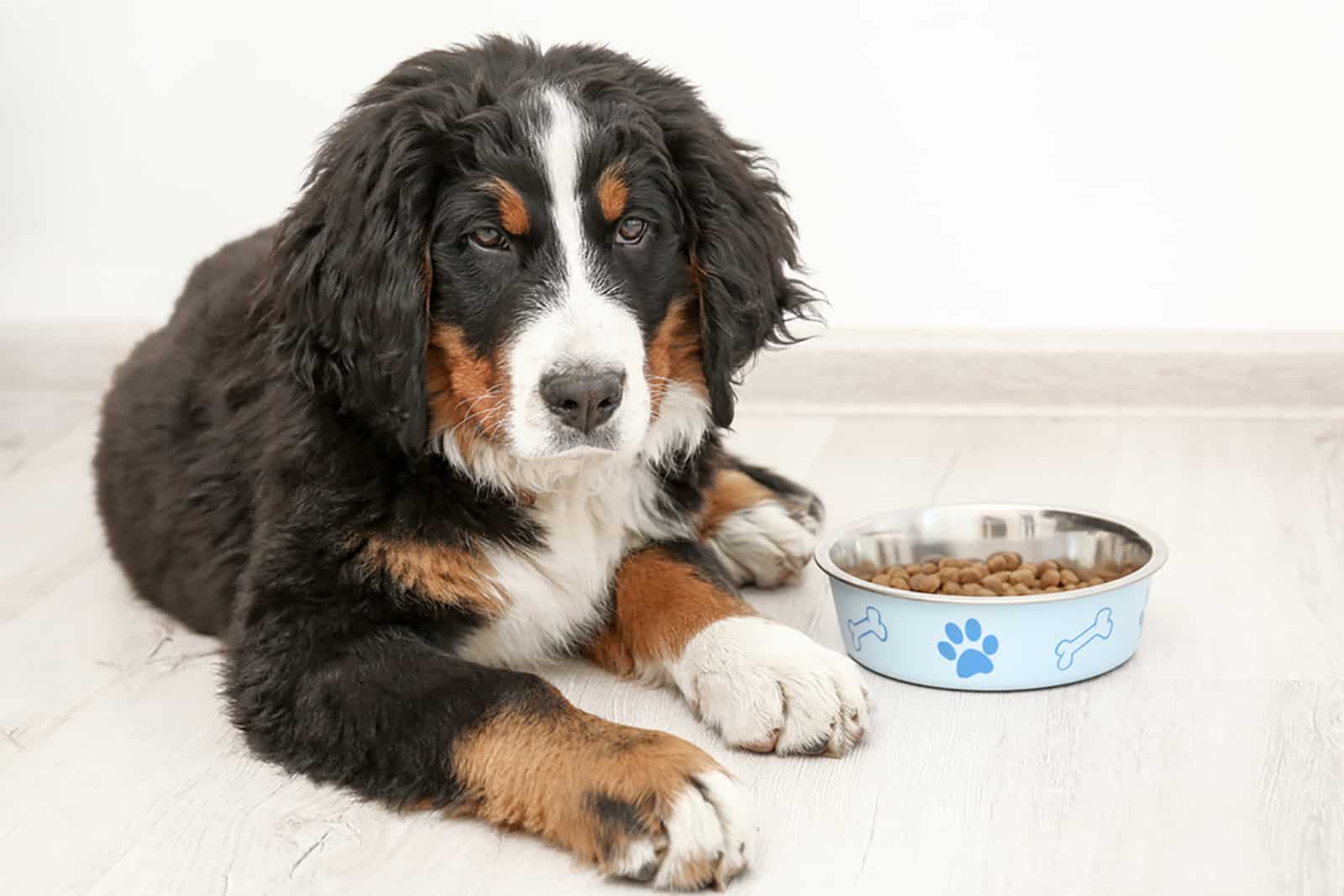Bernese Mountain Dogs are beautiful, large-breed dogs with a sweet nature and a globally-known tricolor appearance. Black, white, and rust coat colors, and a beautiful face with naturally gleaming eyes are almost the breed’s trademark.
This, combined with their loving, affectionate nature makes these dogs the perfect choice for a family companion. However, as a part of a large-breed working dog group, they might be a little bit challenging to take care of.
When it comes to feeding your Bernese Mountain Dog, it is important to apply healthy feeding habits so that your beloved dog that already has a shortened lifespan lives as long as possible.
With a healthy lifestyle, your Berner might even break records as far as lifespan is concerned.
So, if you would like to know what the secret is to keeping your pup as healthy as possible, read on to discover the Bernese Mountain Dog feeding chart and how to achieve the Berner’s healthy diet!
Bernese Mountain Dog Feeding Chart
[table id=519 /]
How Much Does A Bernese Mountain Dog Puppy Eat?

All puppies grow up pretty fast. It is like you have blinked and they are already much bigger and heavier than they used to be.
Feeding an eight-week-old puppy and a four-month-old puppy is not the same, and you should be aware of this difference.
Let’s take a look at how much you should be feeding your Bernese Mountain Dog puppy at different puppy stages:
Birth To Six Weeks
When puppies are born, and all the way up to when they leave for their new home, they are pretty much dependent on their mother, especially in the first couple of weeks.
Breeders should feed puppies with their mother’s milk only because it is the best source of nutrients for them at that time. If that is not possible, then milk formula is a great substitute.
Around four weeks of age, puppies start to become more independent, and then is the time to introduce puppy food step by step.
They will still need their mother’s milk; however, you can give them a small amount of puppy food mixed with water to see if they are interested in it (1/4 of puppy food with 3/4 of water). Why add water, you might ask?
Well, they are still pretty small, and their stomach is still not used to anything other than milk, so it is necessary to add water to ensure that they are able to digest it. At around six weeks of age, the breeders will usually start the weaning process.
They will slowly increase the amount of puppy food (50/50 ratio of puppy food and water) until they are able to eat the food by itself.
RELATED: Best Bernese Mountain Dog Breeders In The States
Eight-Week-Old Berner
At this time, a Bernese Mountain Dog puppy should be completely weaned and ready to go to his forever home. This is the time for you to shine.
Now, you have the responsibility of creating a feeding schedule and choosing the right food, but, of course, you need to be careful with the amount of food you feed your pup.
When you get your puppy from the breeder, the best thing to do is ask him what he was feeding him before, and continue for some time with that food.
Puppies need some time to get adjusted, and changing their food abruptly can cause many health issues – diarrhea and vomiting being some of them.
You can continue with that food choice or gradually introduce some other that you prefer. At this point, you can feed your pup with 3/4 to 1 cup of preferred puppy food per meal four times a day.
12-Week-Old Berner
Around this time, your puppy should be growing nicely and healthily. There will be slight differences between male and female Berners, but nothing too big.
Feed your pup with 1 cup of puppy food per meal, three times a day. You may increase the amount of food if you notice that your pup has high activity levels and needs a little bit more food to keep him going.
However, make sure not to overfeed as these dogs can soon become way too heavy for their own good. A healthy weight is very important for their overall health.
Also, it is important to note that sometimes it can happen that on some days, they eat less food than on other days because they are starting to transition to their adult body and weight, and it may take some time for them to get used to it and a proper feeding schedule.
Although some people advocate free feeding as an option for feeding your Berner because it is convenient and easier, we would better advise you to stick to a feeding schedule.
Don’t let your Berner puppy have unlimited access to food the whole day because it can cause stomach issues and bad feeding habits.
He needs to learn to stick to the feeding schedule, which is three times per day at this point, and he needs to eat everything in about fifteen minutes from receiving the food. Take all the food that has been left in the bowl.
This is the best way to get him used to proper feeding.
Four To Six Months Of Age
During this time, your puppy will be growing significantly (45 to 85 pounds on average), which means that he will also need a lot more food to keep him healthy and active.
They will still need to be fed three times per day, but the amount of food should be much higher since a four-month-old dog needs a lot more food than an eight-week-old puppy.
Generally, the number of cups per day should be gradually increased as the puppy grows and its daily activities increase.
Usually, at this point, dogs will need around three to six cups of food per day.
How Much Does A Full-Grown Bernese Mountain Dog Eat?
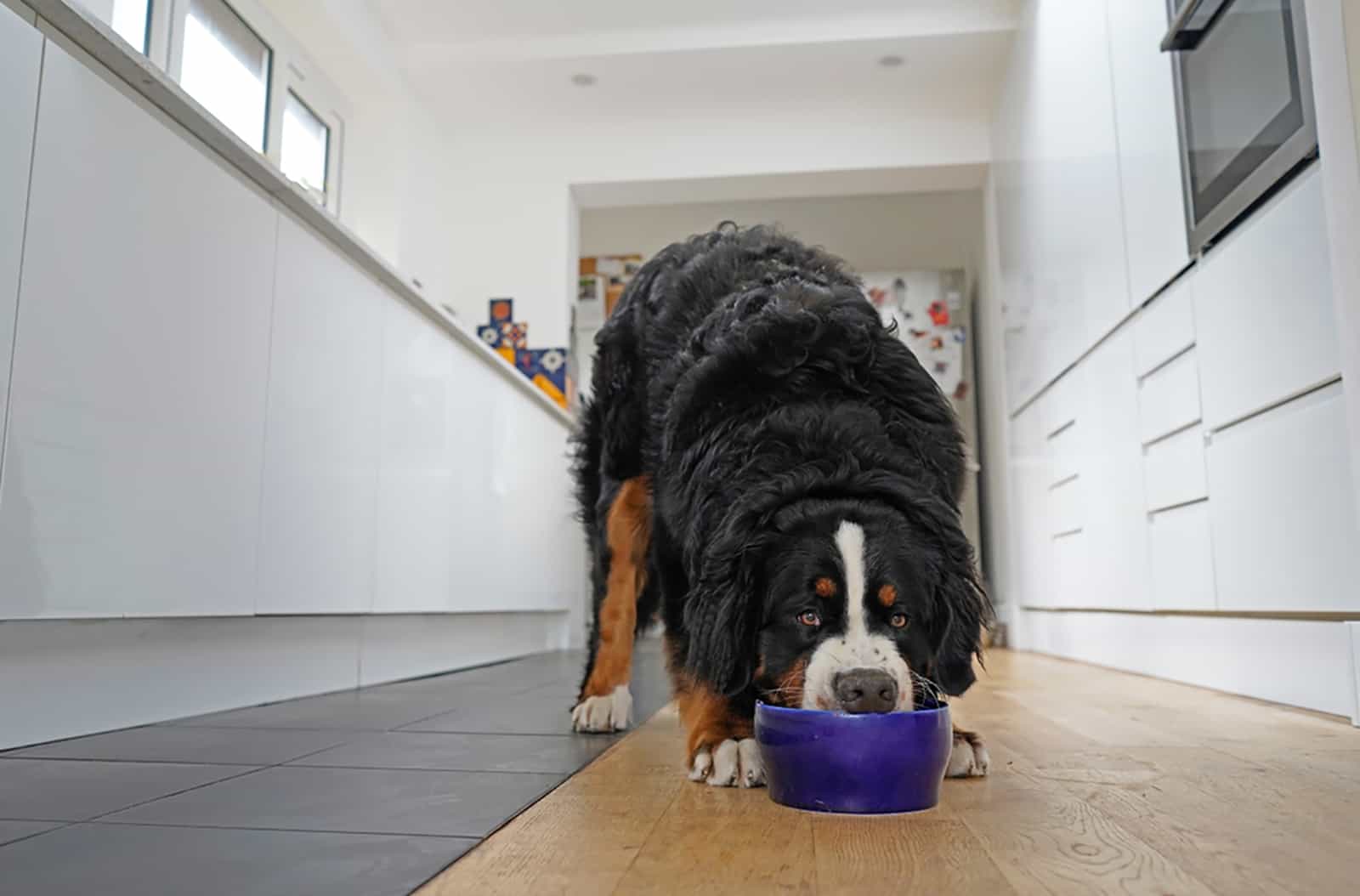
From eight months of age to one year old, Bernese Mountain Dogs are considered to be young adults.
Generally, they are considered to be slow-maturing dogs, so they don’t reach their adult weight and height until they are one and a half to two years old.
Fully-grown Bernese Mountain Dogs weigh around 75 to 120 pounds depending on their gender. It depends on the dog, but generally speaking, after eight months of age, you can start switching to adult dog food.
At this time, the feeding schedule can be reduced to two times per day, and the amount of food should be proportionally increased to the activity levels of your dog and the environment he lives in.
Keep in mind that no dog is the same, so these numbers can be a little bit different for your dog – we are speaking on average of what has been shown throughout the years.
Some even advise that after your dog is a year and a half, you can start feeding him one meal per day, but we advise not to.
Feeding your dog one meal per day can actually be harmful to your dog’s digestive system and cause gas issues.
How Do I Calculate How Much Food To Feed My Dog?
To calculate how much food you should be feeding your dog, you need to take some things into consideration first. Not every dog is the same, nor does it need the same amount of food.
There are some factors that influence a dog’s meal size; for example, the type of food that you choose to feed your dog, and his body weight.
The amount of exercise, the number of meals, and the dog’s metabolic rate also influence the desired amount of food.
Whether you choose to feed your dog kibble, wet food, or raw food, the first step in calculating how much food to give him can be by looking at the feeding instructions on the bag.
Usually, brands will have something like a feeding guide on the back of the bag that will tell you the recommended daily feeding amount. This can always be a starting point; however, you will also need to take your dog’s lifestyle into account.
If your Bernese is more on the lazy dog breed side, he will need less food than one that is very active and burns off more energy on a daily basis. Those will need maybe a little bit more food.
This is important to note because if you are feeding your pup too much, he will soon become overweight. Talk with your veterinarian or a nutritionist who can help you determine the exact amount of food depending on the specific characteristics of your dog.
There are also a lot of “calorie calculators for dogs” on the internet that can tell you a specific amount of food based on the information that you enter.
They usually ask you about your dog’s weight, the type of food you are using, if your dog is spayed/neutered, etc.
What To Feed A Bernese Mountain Dog
Puppy Nutritional Needs
Feeding a puppy is very different from feeding, for example, an adult dog. A dog’s life stages require different nutritional needs. Puppies are much more sensitive than adult dogs, and they need special puppy food that will aid their healthy development.
Just like small human babies, puppies also need mother’s milk at the beginning, which is the best source of nutrients that helps them develop a strong immunity system.
The Association of American Feed Control Officials (AAFCO) recommends that puppy food must contain at least 25% of protein content. Protein sources should be the most important ingredient in your puppy food.
Whatever type of diet you choose, you need to make sure that it has enough protein for your puppy’s healthy development.
Make sure that you check the ingredient list, and that some kind of animal-based protein (chicken, fish, beef, lamb, venison) is definitely on there, preferably in first place.
Other than proteins, puppy food needs to have a higher amount of healthy fats as well, such as DHA, ARA, or omega fatty acids.
Although your dog is still a puppy, Bernese Mountain Dogs are, in the end, large-breed puppies (just like Golden Retrievers or German Shepherds), so make sure that you choose a dog food specifically prepared for this type of dog breed since small breeds and large breeds don’t have the same nutritional needs.
Adult Dog Nutritional Needs
When your Bernese Mountain Dog reaches its maturity, it is time to change from puppy food to adult dog food. This is actually very important because at this time, your dog does not need any more high amounts of protein and fat intake as puppies do.
If you continue feeding your dog puppy food, it may lead to some health problems, such as weight gain and obesity.
These are actually very common health problems for Bernese dogs because they gain weight easily, so you need to be extremely careful about their diet.
What does your adult Bernese need in order to have a well-balanced diet?
High-quality dog food is a must for a dog’s healthy life and healthy body weight. When choosing a brand of dog food, you can be guided by the recommendations we have mentioned before.
Meat-based protein, a healthy amount of fat, and supplements in the form of vitamins, minerals, and probiotics are something that every high-quality adult dog food needs to have in order to achieve all dietary needs.
For adult Bernese Mountain Dogs, the AAFCO recommends around 18% of protein content in every dog food catered for adults.
Just like for puppies, don’t forget to choose a brand of dog food specifically made for large-breed dogs, such as Bernese Mountain Dogs.
Senior Dog Nutritional Needs
Unfortunately, all dogs grow old. Even though we always like to think of our pets as little pooches, they don’t stay young forever.
But, what is important to our topic today is that when the time has come, adult dog food should be replaced with senior dog food.
Bernese Mountain Dogs actually have a very short lifespan, so already around six to seven years, your dog will be considered a senior. If you keep feeding him high-calorie adult dog food, he will soon become overweight.
For senior dog food, it is important to contain a higher amount of fiber, fruits, vegetables, and added vitamins that will keep your pup full between mealtimes and support his immune system, which is by now already weakened and needs every bit of help to keep the dog fit and healthy.
Choose a senior dog food with high-quality content.
Supplements in the form of glucosamine and chondroitin are extremely important for older Bernese Mountain Dogs because at that age, their joints are weakened, and these supplements help maintain the cartilage structure and relieve joint pain.
Bernese Mountain Dog Healthy Diet
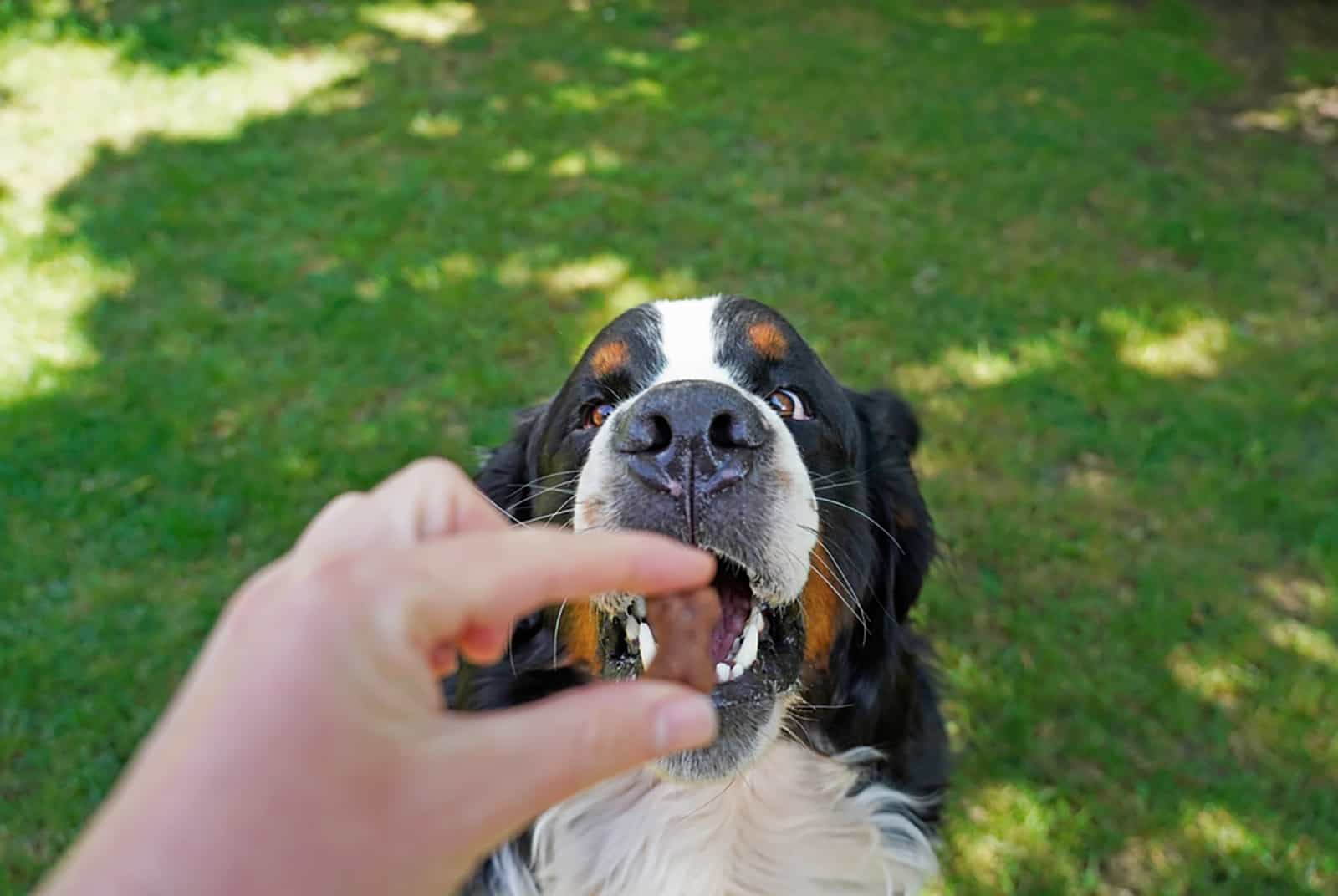
There are many different food options that you could feed your Bernese Mountain Dog. Sometimes, choosing the right diet can be quite confusing, especially for new dog owners. We all want the best for our pups, but what is actually the best?
Dog food companies offer you a wide variety of dog food — dry dog food, wet food, and even raw food.
Various pet stores and online stores (Amazon and Chewy, for example) offer you various brands of each, but it is important to know that not every brand is equally good and nutritious.
When certain brands are well-known and advertised a lot, it doesn’t have to mean that they are immediately high quality and good for your pup.
It is important that you read the ingredient list and understand what ingredients are actually good for your dogs and what are not.
Let’s see together how to choose the best diet possible for your beloved Berner:
Tips For Choosing A Healthy Diet
Many dog owners choose to feed their pups kibble. It is probably the easiest and the most convenient way to feed your dog, but, of course, it is not the only one.
So, whether to choose dry dog food, wet food, or perhaps raw food is completely up to you and your dog’s preferences.
If your dog has some underlying health conditions, we advise you to talk to your veterinarian and, along with his help, construct the best diet possible for your dog’s healthy development and life.
One of the best tips we can give you is to carefully read the ingredient list of every dog food, and make sure to choose the one that is made of the most natural ingredients that does not contain any preservatives, fillers, by-products, or artificial flavors and colors.
If your dog has food allergies, it is best to choose a grain-free formula that will be easier to digest for food-sensitive dogs.
You should look for wheat-, soy-, and corn-free formulas that instead use peas and sweet potatoes, which offer good nutritive value and will not cause health issues.
A well-balanced diet contains an enriched level of vitamins, antioxidants, and minerals. Fruits like blueberries, cranberries, and carrots offer a great antioxidant boost and help support the immune system.
Bernese Mountain Dogs are prone to many orthopedic health issues, so it is important to choose food that has the right amount of calcium in it.
The calcium-to-phosphorus ratio is very important, and it should be as close to 1:1 as possible in order to encourage strong bone and joint development.
What Food Is Bad For A Bernese Mountain Dog?
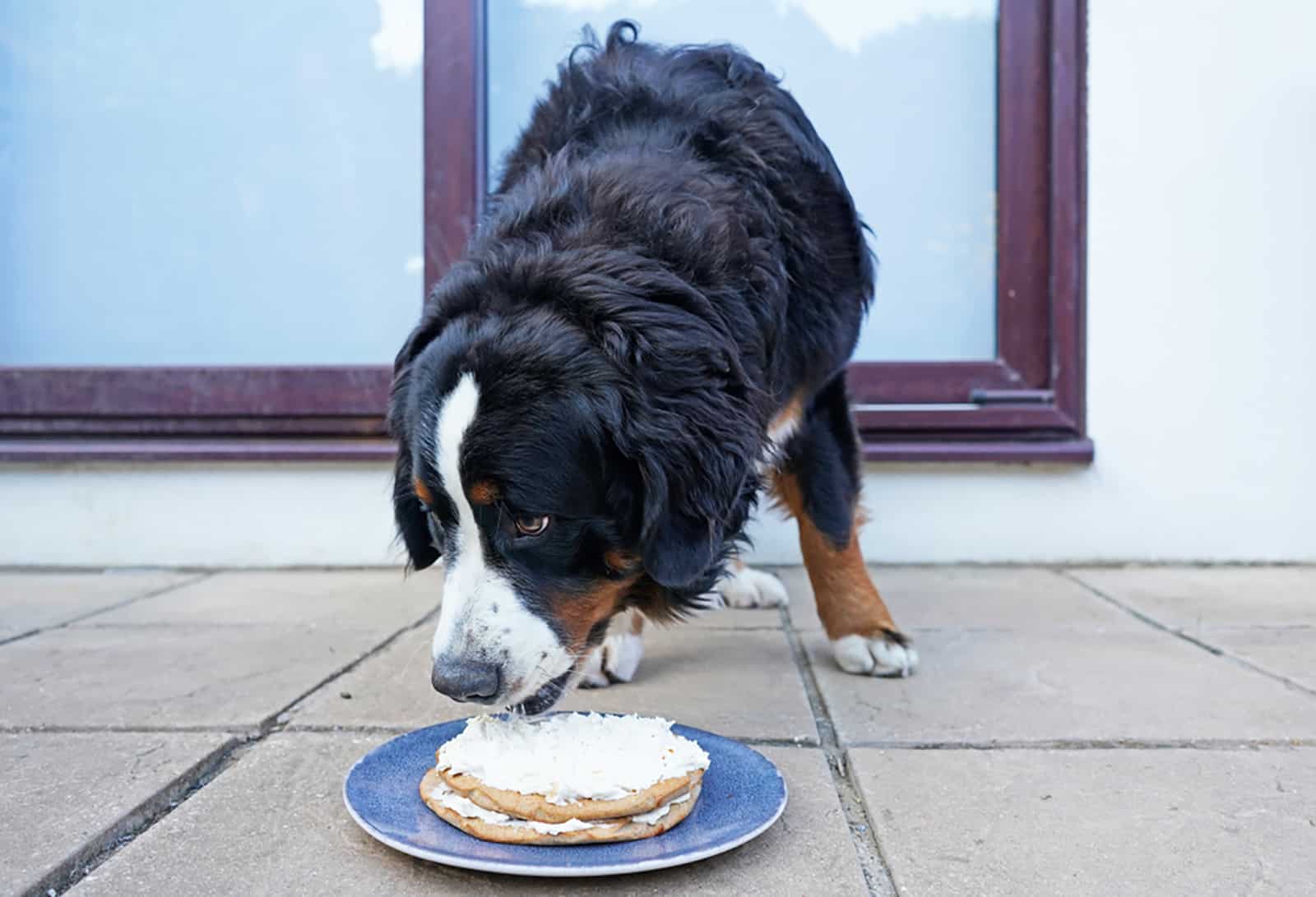
Keeping an eye on what your Bernese Mountain Dog is eating is very important because there are many foods out there (especially human foods) that can be extremely poisonous to these pups.
A lot of dogs are very food driven and absolutely love to eat, so you’ll often find your Bernese begging you to give him some of your food, but if you are not educated enough about what your pup can and cannot eat, then giving him some of your food can be very dangerous.
Every responsible dog owner should know what foods are toxic to their pets so they can avoid making their dog very sick or, in extreme cases, even dead (yes, unfortunately, even that can happen!).
Let’s see what food you must avoid feeding your furry friend:
Onion Family Food
Onion, leeks, garlic, chives, and shallots are something that every human being uses nearly every day in their kitchen.
Onion is the main ingredient of every tasty dish, and we simply cannot imagine cooking without it, but is it as healthy for dogs as it is for us?
Well, while these foods are extremely healthy for humans, for our furry friends, they are not so much.
They can be very dangerous and harmful to them, and you should avoid feeding your pup this food in any form and way, especially if you choose a home-cooked diet.
What happens if your Bernese Mountain Dog eats some of these foods?
Any of these vegetables belonging to these food families can cause anemia and red blood cell damage in dogs if they consume it.
Some of the symptoms include weakness, lethargy, high heart rate, pale gums, or they can even collapse.
If they have ingested any of the foods we have mentioned above, take your pup to the vet immediately even if they don’t show any symptoms, but may start showing a couple of days afterward, which could already be too late.
Rhubarb
Another vegetable that is good for people, but not so good for your pets is rhubarb. Rhubarb contains oxalic acid, which is a substance that can be lethal for dogs if they ingest it in high amounts.
The leaves have the highest amount of this substance in them, but also the root has some of it, so you should be extremely careful not to let your dog get in contact with this vegetable.
Make sure that if you are growing the vegetable in your garden or if you are keeping it in your pantry, you secure it so your dog cannot accidentally find it and eat it.
If he does, take your pet immediately to the vet as you can never know what amount could be lethal to him.
Grapes & Raisins
Fruits like grapes and raisins are delicious and great for people, but not good for dogs. These fruits can cause kidney and liver failure in dogs, which is why it is necessary to act quickly if your dog has ingested some of them.
Usually, it is necessary to make your dog throw up to prevent the toxins from this food from getting deeper in the dog’s system and causing more damage.
Take your dog to the vet immediately because they can give him an injection that will make him vomit.
Chocolate
Who doesn’t love chocolate? This might be everyone’s favorite delicious treat, but did you know that it is very toxic to canines?
Unfortunately, chocolate contains something called theobromine – an alkaloid that is very poisonous to dogs, and can cause kidney failure, and affect the dog’s heart, gut, and central nervous system.
RELATED: 7 Vet-Approved Homemade Dog Food Recipes For Kidney Disease
Symptoms of chocolate poisoning can be seen pretty soon, and they include weakness, vomiting, restlessness, diarrhea, or even seizures.
Avocado
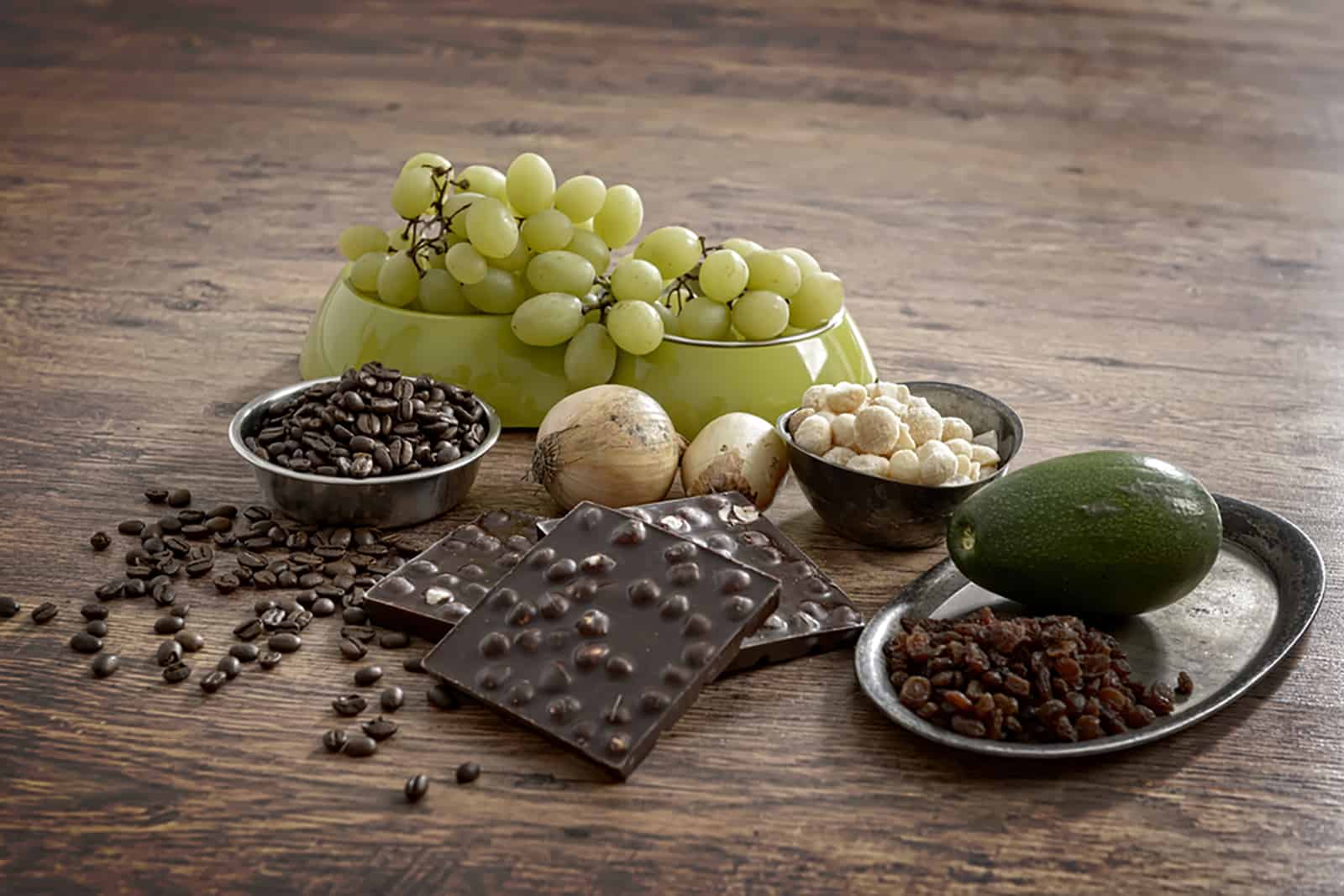
The superfood of the 21st century, avocado is considered to be extremely healthy for humans. However, for our pooches, not so much.
Avocados, on the whole, are not good for dogs. Ingesting any part of this vegetable is toxic for our pets because it contains a toxin called persin that causes diarrhea and vomiting.
Caffeine
Yes, your favorite beverage is also on this list. Most of us cannot imagine starting our day without a cup of coffee, but this substance can be deadly for our canine pets.
Caffeine is not only found in coffee, but in other beverages and food, so you should be very careful what your dog drinks and eats.
Pure, natural water is always the best for them. If you suspect that your dog has drunk a bit of coffee from the cup that you left on the table, contact the veterinarian immediately.
Macadamia Nuts
Who would have thought that all this food that is very healthy for people, on the other hand, is very toxic to our beloved pets… huh?! This is why we have mentioned in the beginning that it is very important to educate yourself on this matter.
Next on our list is macadamia nuts… another food that is very good for us, but toxic for our Berneses. They are actually one of the top human foods that are listed as something that every dog owner must avoid giving their doggies.
Even a small amount of this food can cause serious poisoning in dogs. Some of the symptoms include vomiting, weakness, hyperthermia, swollen limbs, tremors, high body temperature, and panting.
Dairy Products
Any kind of dairy product is not safe for dogs simply because their digestive system does not break down lactose easily, which can cause them to get sick.
Milk, yogurt, and cheese are something that you should avoid giving your dog. Blue cheese is especially toxic to dogs because it contains a substance that can cause dogs to vomit, have diarrhea, seizures, tremors, and high temperature.
To learn more about this topic, make sure to read our article, “Can dogs eat blue cheese?”, and find out all the bits as to why dairy products and lactose are not safe for pups.
Alcohol
Lastly on our list of food to avoid giving your Bernese Mountain Dog is something that is very toxic to dogs as well as to people.
Alcohol is much more toxic to dogs than it is to we humans, so you should avoid giving it to your pup at all costs, not even out of a joke.
Even small amounts of alcohol can cause intoxication, vomiting, diarrhea, lack of coordination, breathing problems, tremors, coma, and death.
So, please don’t joke and give your dog some wine or beer because you think it will be funny to see your pup drunk.
This can end up being very tragic, and I am sure that no one wants to experience it. It goes without saying that if it happens, though, call your vet immediately and bring him to the vet emergency for further examination and treatment.
Bernese Mountain Dog Refusing To Eat
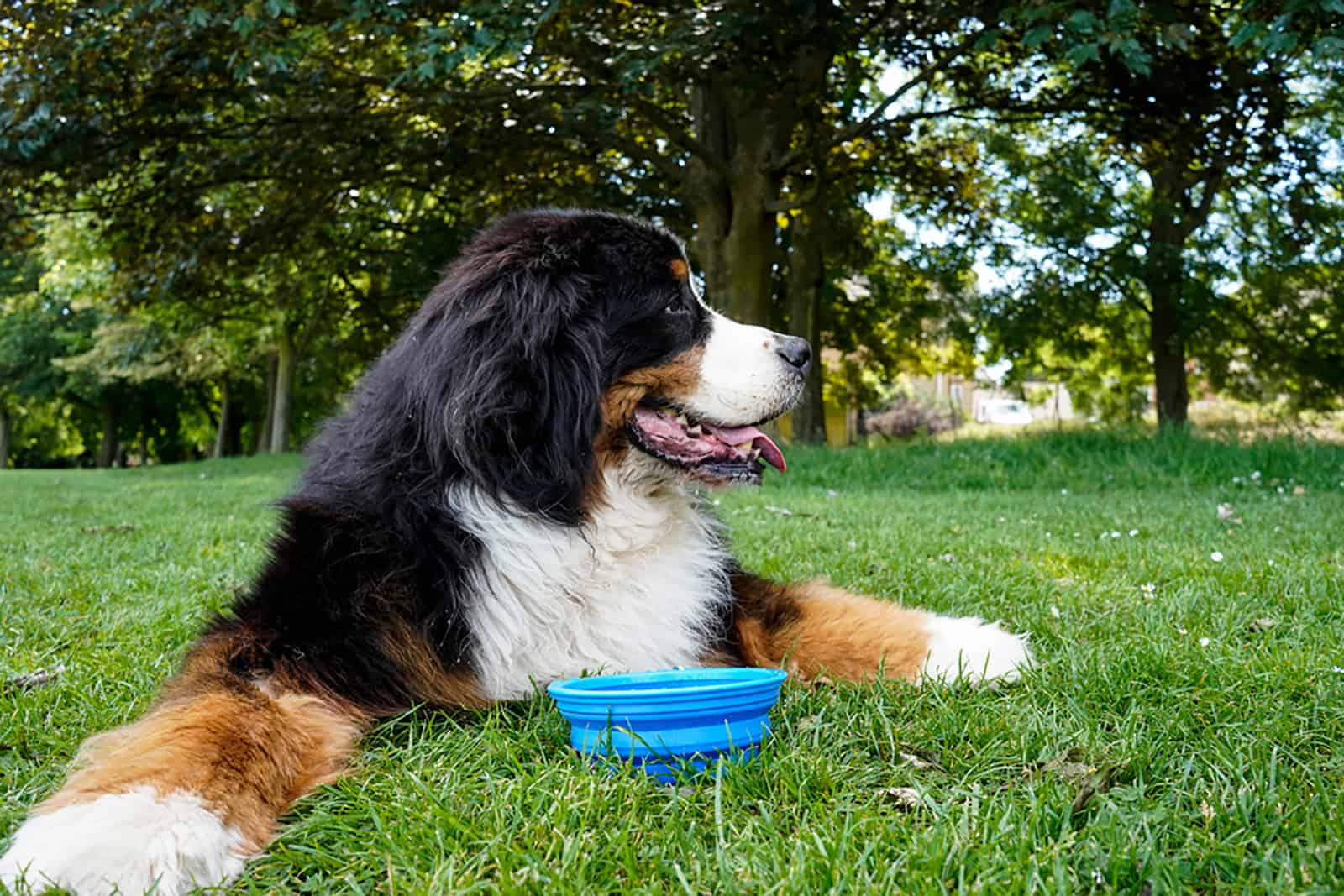
If your Bernese Mountain Dog is refusing to eat, it is a warning sign that something is not alright. It can either mean that they don’t like the food, they are bored with it, or they have some health problems.
If your dog doesn’t look sick and you assume that he is perhaps bored of the same food every day or he doesn’t like the new food you introduced, then the simple solution is to try some other food brand until you find the one he likes and wants to eat.
Unfortunately, lack of appetite is usually a sign of some underlying health issue that your dog might be dealing with. Food allergies and digestive problems are often the reason behind not eating.
Take your dog to the vet, who will examine your pup and find the exact reason that is causing him not to eat. Another reason can be related to your dog’s teeth and various dental issues that can keep your dog from eating normally.
These are the most common reasons, but various other illnesses that cause pain can prevent your dog from eating normally as usual. Instead of guessing what might be wrong or waiting for it to pass, please ask the professionals for help.
However, if you need some ideas on how to help your sick pup, make sure to read our article about what to feed a sick dog with no appetite!
Final Thoughts
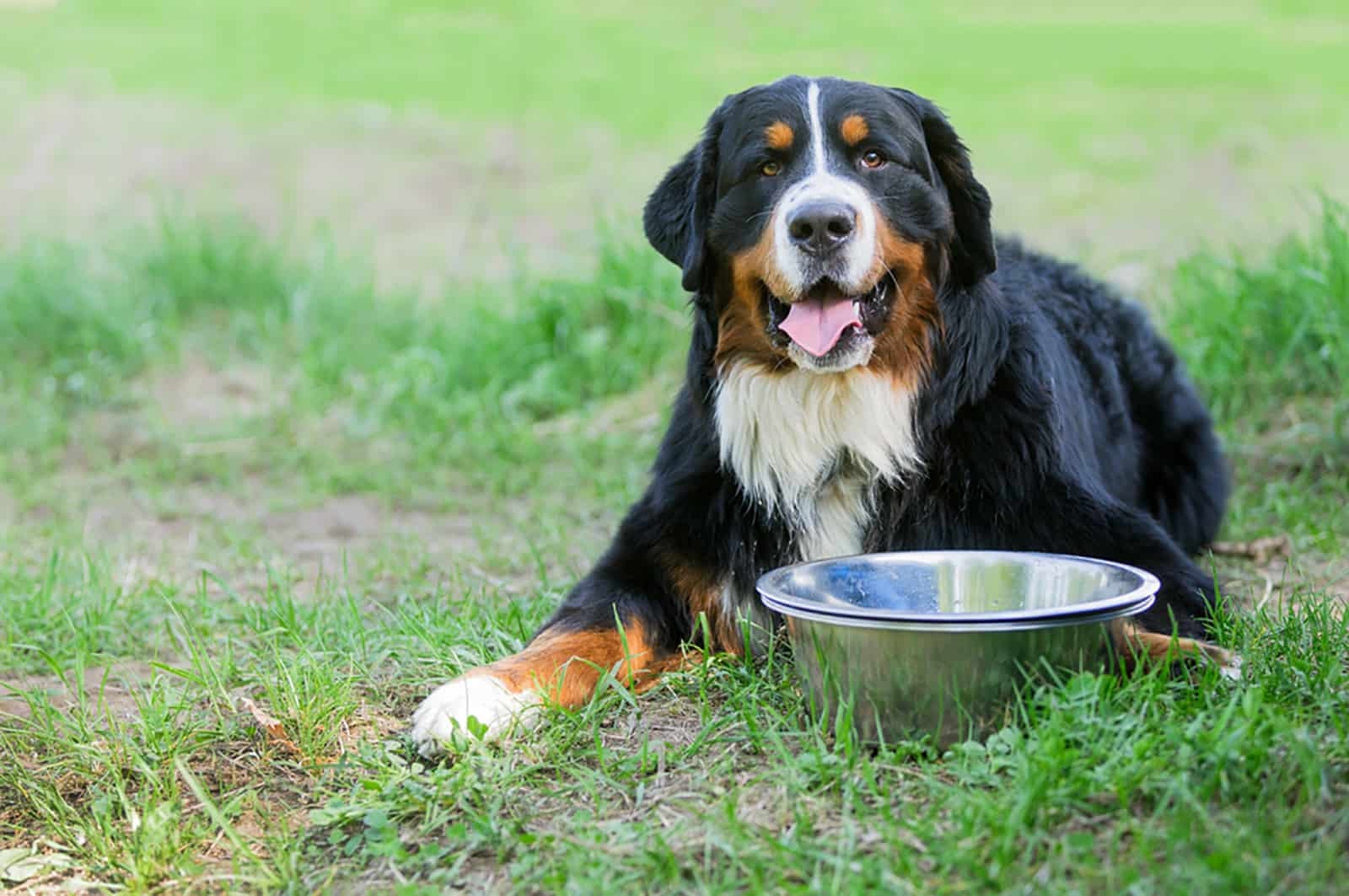
Now that you have learned everything about the Bernese Mountain Dog feeding chart, the only thing left to do is try to incorporate it into your dog’s lifestyle.
Healthy feeding habits and a feeding schedule are very important in keeping your dog as healthy as possible.
Berners are known as food lovers, and they can easily become overweight or even obese, which can negatively affect their health, so it is important that you pay attention to their meals.
In the end, it is also important to remember that every dog is a little bit different, and that you should never strictly follow the numbers.
Always take your dog’s personality and needs into consideration, and let him guide you to what is best for him.
Try to combine the things we have mentioned in this article with your dog’s unique characteristics and you’ll definitely see the best results.
Related Content:
• Australian Shepherd Feeding Chart: How Much Should Aussies Eat?
• Cockapoo Feeding Chart: Everything You Need To Know
• Doberman Feeding Chart – What A Perfect Dog Diet Looks Like
